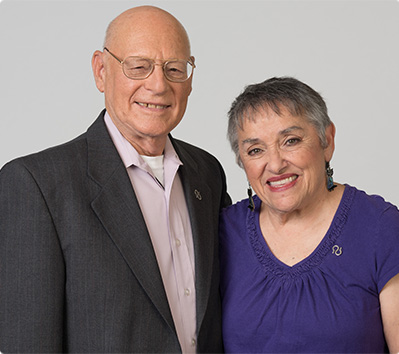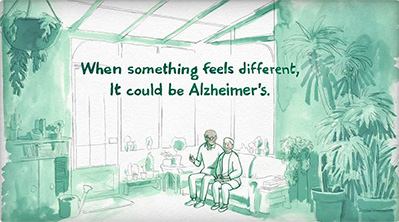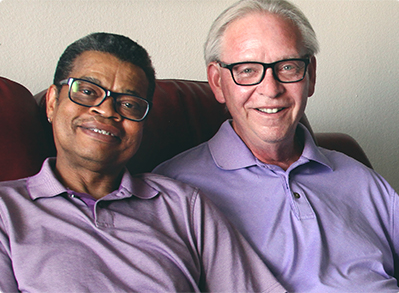
Double Your Love. Double Your Impact.
Double Your Love. Double Your Impact.
Help provide 2x the care and support for millions affected by Alzheimer’s and advance research to bring us closer to a cure. Make a gift during our Double the Love 2x Match now.
Donate NowTime to Talk
Difficult Conversations About Health Shouldn’t Wait; Learn How Others Approached Their Loved Ones
Difficult conversations about health shouldn’t wait
 Julie Burger hid her symptoms of dementia from her husband for more than a year. But the once voracious reader with a photographic memory knew it was finally time to speak up when she could no longer read a novel — she would forget what happened on the previous pages.
Julie Burger hid her symptoms of dementia from her husband for more than a year. But the once voracious reader with a photographic memory knew it was finally time to speak up when she could no longer read a novel — she would forget what happened on the previous pages. Her husband of 59 years, Les Burger, a retired physician, didn’t suspect anything was wrong until Julie told him.
“I think Julie was in denial,” says Les. “I certainly would’ve preferred for her to come forward when she first started experiencing symptoms. But I think denial can be a natural tendency.”
Together, they visited the doctor and Julie was diagnosed first with mild cognitive impairment, and then, in 2016, Alzheimer’s disease.
A challenging conversation
 Talking about health concerns, especially memory loss, can be difficult. In most cases, family members are the first to notice memory issues or cognitive problems in a loved one, but are hesitant to say something. According to a recent Alzheimer’s Association survey, nearly 75% of Americans say it would be challenging to approach someone who was showing signs of memory loss or other symptoms of dementia. However, nearly 90% say they would want others to tell them if they were showing the signs themselves.
Talking about health concerns, especially memory loss, can be difficult. In most cases, family members are the first to notice memory issues or cognitive problems in a loved one, but are hesitant to say something. According to a recent Alzheimer’s Association survey, nearly 75% of Americans say it would be challenging to approach someone who was showing signs of memory loss or other symptoms of dementia. However, nearly 90% say they would want others to tell them if they were showing the signs themselves. “It can be daunting to approach the subject with someone,” says Ruth Drew, Alzheimer’s Association director of Information and Support Services. “But it’s important for people to understand that having the conversation and encouraging someone to see a doctor is an act of love.”
Speaking up and taking action
Tom Doyle, who lives in Chicago, was a professor of education when he began to notice changes in himself.“I was a professor for 25 years and knew the classes inside and out,” Tom says. “All of a sudden, I started to have trouble remembering simple things that I had taught for years and it was terrifying.”
 Tom opened up to his husband, Levi Doyle, about what he was experiencing at work. He describes the conversation as “liberating” because it was “too difficult to keep it all inside.” For Levi, who noticed that Tom was increasingly confused at home, the conversation confirmed the seriousness of the issue. The couple sought a medical evaluation and Tom was diagnosed with dementia with Lewy bodies.
Tom opened up to his husband, Levi Doyle, about what he was experiencing at work. He describes the conversation as “liberating” because it was “too difficult to keep it all inside.” For Levi, who noticed that Tom was increasingly confused at home, the conversation confirmed the seriousness of the issue. The couple sought a medical evaluation and Tom was diagnosed with dementia with Lewy bodies. Despite his own fears of what was to come, Levi knew they needed to start making plans.
“I asked Tom where he would feel most supported,” Levi says. “So we packed up our life in California and moved to Illinois to be closer to his family, which has been great for both of us.”
In addition to providing time to plan, an early diagnosis can provide access to medical treatments to address symptoms as well as education and support programs.
Finding courage and support
In June, the Alzheimer’s Association launched the advertising campaign “Our Stories” with the nonprofit Ad Council to encourage and empower people to speak up when they notice something is different. The ads feature Julie and Les Burger, Tom and Levi Doyle, and other families describing the conversations they had to address changes.“People can connect with our stories and say, ‘Wow, that’s me’ or ‘That’s Mom or my spouse,’ and that’s incredibly helpful in encouraging them to take the appropriate next steps, including seeing a doctor,” Les says.
Helpful conversation starters
If you notice changes in yourself or another person, here’s what to say:- “I’ve noticed you’re having trouble concentrating and doing everyday things. Can we talk to a doctor about it?”
- “It seems like you haven’t been yourself lately. We should go see the doctor about it.”
- “I’m not sure what it is, but I just don’t care about important things the way I used to. I want to talk to a doctor about it.”
- “I’ve been getting lost lately and it’s pretty unsettling. I think we should talk to a doctor.”
